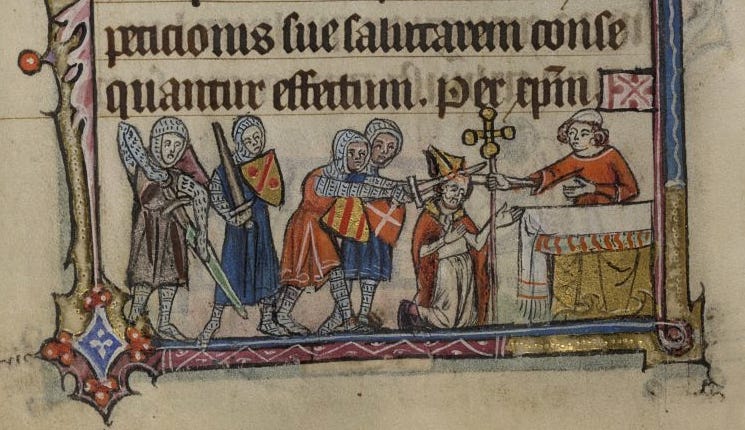Today in History: December 29-31
Happy New Year!
Foreign Exchanges is (mostly) on holiday break, but if you enjoy the content here please consider starting 2020 with a subscription! Your support will help grow the newsletter and give you access to a growing list of subscriber-only features, including exclusive podcasts and essays.
December 29, 1170: Four knights who believe they are acting on orders from English King Henry II assassinate the Archbishop of Cantebury, Thomas Becket, in Cantebury Cathedral. Becket and Henry had struggled through a series of major disagreements over the extent of the king’s authority over the English Church. A final dispute over the coronation of Henry the Young King in June allegedly prompted King Henry to exclaim “Will no one rid me of this turbulent priest?” and that apparently convinced least these four knights that their king wanted Becket dead. Whether Henry actually said this, or something like it, is a matter of some debate, but whatever he said it’s thought to be unlikely that he intended to order Becket’s assassination. It’s noteworthy, in this respect, that apart from these four men nobody else even at the time seemed to think that Henry wanted Becket dead.

Thomas Becket’s martyrdom, a miniature from a manuscript of the medieval Christian devotional Book of Hours (Wikimedia Commons)
December 29, 1911: The Qing dynasty, which had ruled China since 1636, gives way to the Republic of China as Sun Yat-sen is named China’s first provisional president (he formally took office on January 1, 1912). Outer Mongolia also declares its independence from China and names Bogd Khan (d. 1924) as its new ruler. Commemorated today as Mongolian Independence Day.
December 30, 1066: A mob in the city of Granada bursts into the royal palace, seizes and crucifies ruler Badis al-Muzaffar’s Jewish vizier, Joseph ha-Nagid, and finally marches through the city slaughtering hundreds or perhaps thousands of Jewish residents. The Granada Massacre, as it’s called, appears to have been borne of little more than anti-Jewish animus directed toward the powerful vizier. It shows that even in the “Convivencia” period, considered a golden age for religious tolerance and coexistence in Europe, people weren’t all that tolerant.
December 30, 1906: The All-India Muslim League is founded on the final day of the All-India Muhammadan Educational Conference in the city of Dhaka (in modern Bangladesh). The League’s advocacy for a Muslim majority state in British South Asia was instrumental in convincing the UK government to partition its colony into predominantly Muslim Pakistan (which at the time included Bangladesh) and predominantly Hindu India in 1947.
December 30, 1922: The Union of Soviet Socialist Republics is formed by the Russian Soviet Federative Socialist Republic (which at the time included the future Central Asian SSRs), the Transcaucasian Soviet Federative Socialist Republic (a union of Armenia, Azerbaijan, and Georgia), the Ukrainian Soviet Socialist Republic, and the Byelorussian Soviet Socialist Republic.
December 31, 1229: King James I of Aragon enters the city of Medina Mayurqa (modern Palma de Mallorca), completing the Aragonese conquest (or “reconquest,” if you must) of the island of Mallorca. An Aragonese army had besieged the city for three months before finally gaining victory.
December 31, 1992: Czechoslovakia is officially dissolved, with the Czech Republic and Slovakia each going their separate ways, under the terms of an act passed by parliament in late November. The so-called “Velvet Divorce” (named after the 1989 Velvet Revolution and to highlight the lack of violence involved) became inevitable when the Slovak National Council declared independence on July 17. Prior to that, negotiations between Czech and Slovakian national groups had discussed the possibility of adjusting the nature of their federation, though as the Czechs pushed for a tighter federation and the Slovaks a looser one, there wasn’t much common ground to be had.


hey derek love your new twitter display name okay thats all for now sorry